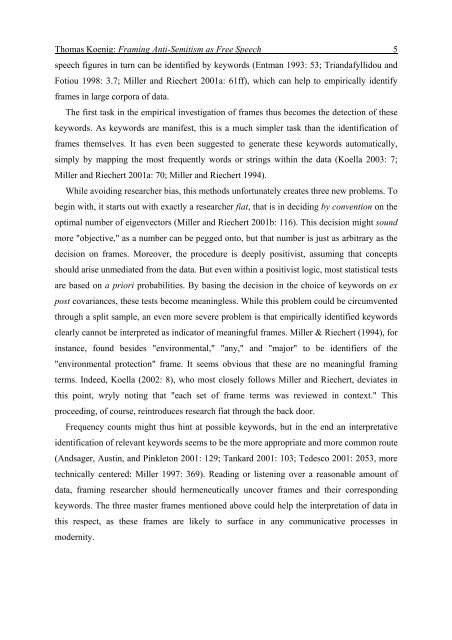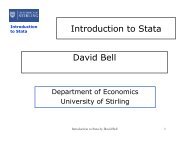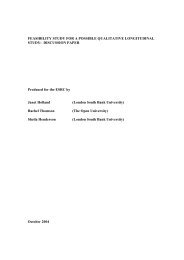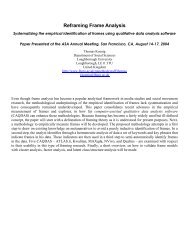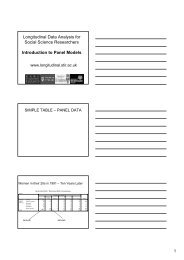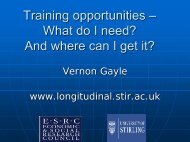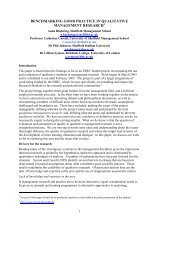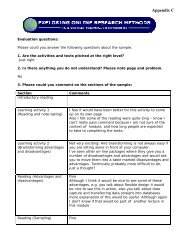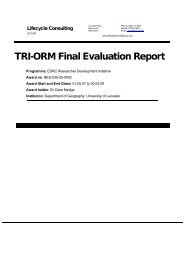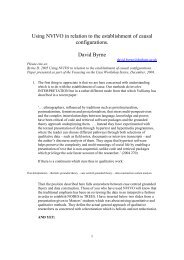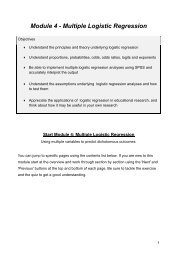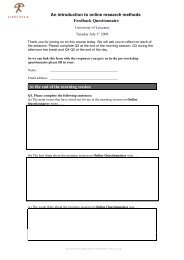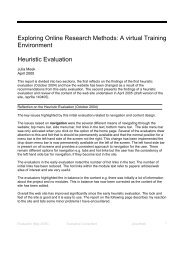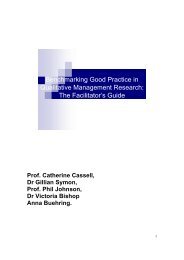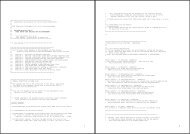You also want an ePaper? Increase the reach of your titles
YUMPU automatically turns print PDFs into web optimized ePapers that Google loves.
Thomas Koenig: Framing Anti-Semitism as Free Speech 5<br />
speech figures in turn can be identified by keywords (Entman 1993: 53; Triandafyllidou and<br />
Fotiou 1998: 3.7; Miller and Riechert 2001a: 61ff), which can help to empirically identify<br />
frames in large corpora of data.<br />
The first task in the empirical investigation of frames thus becomes the detection of these<br />
keywords. As keywords are manifest, this is a much simpler task than the identification of<br />
frames themselves. It has even been suggested to generate these keywords automatically,<br />
simply by mapping the most frequently words or strings within the data (Koella 2003: 7;<br />
Miller and Riechert 2001a: 70; Miller and Riechert 1994).<br />
While avoiding researcher bias, this methods unfortunately creates three new problems. To<br />
begin with, it starts out with exactly a researcher fiat, that is in deciding by convention on the<br />
optimal number of eigenvectors (Miller and Riechert 2001b: 116). This decision might sound<br />
more "objective," as a number can be pegged onto, but that number is just as arbitrary as the<br />
decision on frames. Moreover, the procedure is deeply positivist, assuming that concepts<br />
should arise unmediated from the data. But even within a positivist logic, most statistical tests<br />
are based on a priori probabilities. By basing the decision in the choice of keywords on ex<br />
post covariances, these tests become meaningless. While this problem could be circumvented<br />
through a split sample, an even more severe problem is that empirically identified keywords<br />
clearly cannot be interpreted as indicator of meaningful frames. Miller & Riechert (1994), for<br />
instance, found besides "environmental," "any," and "major" to be identifiers of the<br />
"environmental protection" frame. It seems obvious that these are no meaningful framing<br />
terms. Indeed, Koella (2002: 8), who most closely follows Miller and Riechert, deviates in<br />
this point, wryly noting that "each set of frame terms was reviewed in context." This<br />
proceeding, of course, reintroduces research fiat through the back door.<br />
Frequency counts might thus hint at possible keywords, but in the end an interpretative<br />
identification of relevant keywords seems to be the more appropriate and more common route<br />
(Andsager, Austin, and Pinkleton 2001: 129; Tankard 2001: 103; Tedesco 2001: 2053, more<br />
technically centered: Miller 1997: 369). Reading or listening over a reasonable amount of<br />
data, framing researcher should hermeneutically uncover frames and their corresponding<br />
keywords. The three master frames mentioned above could help the interpretation of data in<br />
this respect, as these frames are likely to surface in any communicative processes in<br />
modernity.


